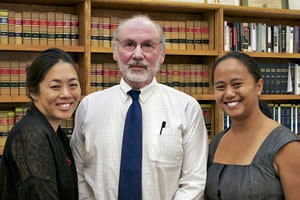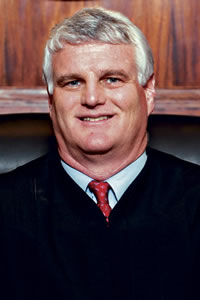Making Justice For All A Reality

By .(JavaScript must be enabled to view this email address)

|
With liberty and justice for all - Pledge of Allegiance
When you recited the Pledge of Allegiance in grade school, did you think the words “justice for all” would ever be a bone of contention? The way the judiciary works today, there is justice for “some,” and for 20 percent of Hawaii’s population, there is justice for “none.”
Now we’re not suggesting that you recite the Pledge of Allegiance any differently. Justice for “a certain percentage” just doesn’t have the same cadence and might incite riots.
But that’s a fact, and no one knows it better than Hawaii’s Access to Justice Commission.
The judiciary task force was formed in 2007 to address inequities in the delivery of legal services to citizens, particularly those who can’t afford lawyers when they need them.
It is in settling civil matters where there are serious gaps in services for the poor and middle class. Here’s where access to justice gets tricky, and only one in five residents currently gets their legal needs met. Worse yet, only one in three who contact nonprofit legal service providers is helped.
A series of community meetings begins this week to address the issue of access to justice, and you and 100 of your closest friends are cordially invited.
The first meeting is Wednesday, Jan. 11, 6 to 8 p.m., at The Parish of St. Clement, 1515 Wilder Ave., with presentations by Chief Justice Mark E. Recktenwald and Associate Judge-Commission Chairman Daniel R. Foley. Future dates are May 9, Windward Oahu, and Nov. 14, Leeward/Waianae Coast, locations and times to be determined.

|
The meetings are presented by the Hawaii Access to Justice Commission to inform the public, particularly lowand moderate-income residents, how to get assistance in civil legal matters.
If you’ve ever had to deal with heart-wrenching situations, such as child custody battles, housing scams or domestic violence disputes, you know how demanding the legal process is. Besides a lot of time, it takes resources to retain legal counsel, understand the judicial process and fill out complex forms.
In a 2007 study, the commission learned that the greatest unmet civil legal needs are in housing (24 percent), family (23 percent), domestic violence (8 percent) and consumer complaints (7 percent).
But hope reigns, thanks to the work of the Access to Justice Commission.
Chief Justice Recktenwald says, “Over the last three years, the commission has made impressive and real progress in providing practical solutions to the ongoing challenge of improving access to the civil justice system for low-income individuals in Hawaii.”
These include encouraging attorneys to commit more pro bono (donated) time for the public good, supporting proactive legislation and seeking funding for nonprofit legal service providers.
When one segment of a community is denied access to justice, the effects are far-reaching, according to Recktenwald.
Recktenwald and Foley will report on the work of the commission at the community hearings. A question-and-answer period is aimed at getting community input, particularly regarding barriers to legal services.
A “mini legal fair” presented by the Hawaii Consortium of Legal Service Providers will showcase resources available to those needing help.
State Rep. Della Au Belatti, one of 22 volunteer commission members, looks forward to getting community input: “This is an opportunity to identify the barriers in providing legal services to needy citizens. It’s also an opportunity to educate legislators who set policies to enhance the quality of justice for constituents.”
On the issue of barriers, Hawaii is pressed with the needs of a growing immigrant community. Language and culture impact access to justice. Consider that 20 percent of Hawaii residents are foreign-born and that 25 percent speak a language other than English. The shortage of competent, neutral interpreters is a major problem, according to the commission.
Judge Foley says, “We also want to make it easier for people who do not have lawyers to navigate the court system. The development of self-help centers has made courts more user-friendly. When people have justice, everybody benefits.”
Nalani Fujimori Kaina, director of the Legal Aid Society of Hawaii that serves more than 9,000 clients a year, says, “Dignity and respect, that’s what we’re trying to give people who need to be heard. When people are upset with our justice system it’s because their voices aren’t heard.”
She adds, “The services that civil justice serves are fundamental to our principles of democracy and basic necessities of life: family, housing, access to public assistance. People striving for these essentials deserve their day in court.”
As one observer put it, “The only thing less popular than a poor person these days is a poor person with a lawyer.”
E-mail this story | Print this page | Comments (1) | Archive | RSS Comments (1) |
Most Recent Comment(s):
For all comments click here.














Mahalo Susan (& Midweek) for reporting on the work of the Access to Justice Commission. Getting the word out about the important work of this Commission will ensure that there is greater access to the legal justice system for all!
Posted by Della Au Belatti on 01/11 at 09:44 PM